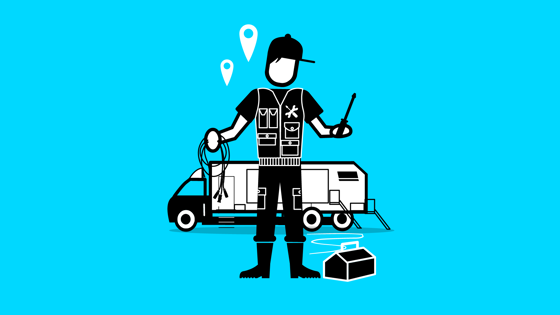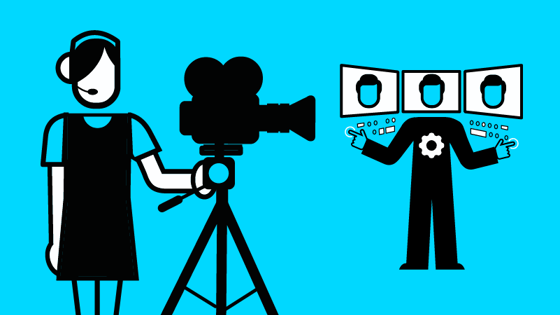Broadcast engineering
Outside broadcast (OB) engineer

What does an outside broadcast (OB) engineer do?
Outside broadcast (OB) engineers work on getting live events to air. They could be sent to work on a royal wedding at Westminster Abbey, the football World Cup in Qatar or a war zone in Ukraine. If you’re looking for a job with lots of variety and buzz, OB engineering could be for you.
OB engineers are experts at the engineering involved in broadcasting live programmes. Although they’re based in an office or studio somewhere in the UK, they often work on location wherever a programme is being broadcast, whether that’s in the UK or abroad.
When they’re working at base, OB engineers look after the equipment and vans, known as OB vehicles, used for outside broadcasts. When on location, they operate the OB vehicles and equipment needed to broadcast a programme, sometimes in difficult conditions. At base, an OB engineer’s hours are usually structured and predictable, but on location they often work long hours, sometimes overnight and at weekends. When covering breaking news, they may have to travel at short notice.
OB engineers must be flexible and good at working under pressure, as they sometimes need to fix equipment in time for an important broadcast to go out, such as the Olympics opening ceremony or the headline act at Glastonbury. Prioritising their workload is important. They also need to make sure power isn’t lost during a broadcast and to check their team are working safely.
An excellent understanding of broadcast technology is a must for an OB engineer. This is so they can fix a problem as quickly as possible. They must have the know-how to work with camera and sound equipment, such as being able to check colour levels look right. They must be able to work with high definition (HD) and ultra-high definition (UHD) vision. At a more senior level, OB engineers might advise production companies on building and refurbishing studios.
Watch and read
- 3D virtual tour of an OB truck – broadcasting company, NEP Group
- How the BBC’s Springwatch was produced in the age of the coronavirus
- Tech used on I’m a celebrity 2020 – Gravity Media
What is an OB engineer good at?
- Working under pressure: keeping calm in difficult conditions and meeting tight deadlines
- Technical knowledge: having a good understanding of how the equipment needed to broadcast a programme works
- Thinking outside the box: Coming up with new solutions to fix technical problems
- Teamwork: Reassuring colleagues, giving clear instructions and advice; collaborating with people in lots of different roles
- Flexibility: Travelling at short notice and working around the clock
Who does an OB engineer work with?
A range of colleagues, such as producers, presenters and camera operators. They also work with a technical team, which includes sound and vision operators, a location engineer and technical manager.
How do I become an OB engineer?
You need to be great at technology, especially finding solutions to problems that stump other people. Most OB engineers have a degree in engineering or technical media. Others may have crossed over from a related field, such as broadcast maintenance or working as a location engineer. They usually have about three years’ experience under their belt before making the transition and will need additional training to gain the skills needed to work as an OB engineer.
At school or college
If you’re interested in a career as an OB engineer, A-levels in maths, physics and computer science would be good to get under your belt. You could combine these with subjects from the arts and humanities, such as English, history or music, which may come in useful for the content of the programmes you work with. Languages are also handy if you need to travel or want to work with foreign broadcasters – studying A-level Spanish might be your ticket to working at the 2026 World Cup in Mexico!
The following Level 3 vocational qualifications are also relevant to this role:
- BTEC in Engineering with Engineering Maths
- Cambridge Technical Extended Certificate in Engineering
- BTEC National Foundation Diploma in Engineering
- C&G Technical Certificate in Engineering
- EAL Technical Diploma/Extended Diploma in Engineering Technologies
- BTEC Diploma/Extended Diploma in Electrical and Electronic Engineering
- City & Guilds Advanced Technical Diploma in Electrical Installation
- EAL Diploma/Advanced Diploma in Electrical Installation
Selected schools and colleges have also started offering T-levels – a qualification equivalent to three A-levels that is designed to help you get into the industry of your choice. Study is 80% classroom- and 20% work placement-based.
The following T-levels would help to kick-start your career in broadcast engineering:
- Media, Broadcast and Production
- Digital Production, Design and Development
- Digital Support Services
- Digital Business Services
- Design and Development for Engineering and Manufacturing
- Maintenance, Installation and Repair for Engineering and Manufacturing
- Engineering, Manufacturing, Processing and Control
Apprenticeships
Apprenticeships are jobs with training. Search for apprenticeships in broadcast engineering with broadcasters like BBC and Sky. Go to What’s an apprenticeship? to find out more and Where can I find an apprenticeship? to find apprenticeships in your region. Alternatively, you can approach companies directly. Take a look at our list of apprenticeships to find the schemes of the main broadcasters.
The BBC has a three-year broadcast and media systems degree apprenticeship that offers a mix of practical experience and university study in all areas of media systems engineering. You may also be interested in the level 3 apprenticeship for broadcast and media systems technical operator.
Volunteer
Get involved with events in your local community, whether that’s running the sound for your school play, managing the special effects for an amateur dramatics society or helping out at a volunteer-run radio station.
Contact theatre productions or local music venues that can get you behind the scenes of a production environment. Anything that gives you experience in dealing with equipment in a live environment will be helpful. Voluntary experience is great for your CV, because it shows you’re enthusiastic, have technical ability and experience and you work well as part of a team.
Get a degree
A degree in a maths or science subject would stand you in good stead for entering the world of broadcast engineering. You could also look at electronic engineering, software design or computing. Go to ScreenSkills Select to find university and college courses accredited by ScreenSkills.
Look outside the industry
If you can’t or don’t want to get into broadcast engineering straight away, industries that require similar skills include telecoms, live events and radio. These would enable you to strengthen your technical abilities and get experience with technical equipment.
If you want to take on a more senior role as an OB engineer, try to find roles that provide experience with technical equipment as well as increasing responsibility within a team. For roles that have both technical and managerial aspects, look into smaller film and music video productions.
Get work experience
Write to local production companies and ask if they offer technical assistant roles. Keep an eye out for work experience opportunities at the BBC, ITV, Channel 4, Sky and the PACT Indie Diversity Training Scheme.
Alternatively, try approaching a rental equipment company that supplies productions with the gear they need. This will enable you to get your hands on equipment, learn more about it and get to know people who work in TV.
Take a short course
If you are over 18, make a ScreenSkills account and check out ScreenSkills’ Training and opportunities page and click on Training to see what courses are available, whether they are in person or online. The training doesn’t have to be linked directly to broadcast engineering; for example, a short course on developing resilience would help you understand how to thrive in challenging circumstances.
Network
Get to know people in the film and TV industry by attending events such as ScreenSkills’ Open Doors. Go to training and opportunities and use the events filter to find out what’s on. Meet professionals and ask them questions about their work, while demonstrating interest in and knowledge of the industry. Offer to provide them with your professional contact details and try to stay in touch with them. Go to network well to learn how to do this.
Network online
Create a LinkedIn profile. See if there are Facebook pages or other social media groups for people making film and TV in your area. Create a ScreenSkills profile. There are a lot of crewing agencies that will charge you to be on their books. Sign up to the free ones initially. Wales Screen, Northern Ireland Screen and Filming in England offer free crew databases and opportunities to network in person. Find a film office near you and get connected. If you do sign up to paid sites, make sure they specialise in the areas in which you’re interested.
Search for jobs
Search for jobs on the broadcasters’ websites as well as on LinkedIn and other job-hunting websites. Make use of the ScreenSkills jobs board. You can also send a short speculative letter with your CV to technical managers or vision supervisors.
You might also be interested in...
Being a location engineer, technical manager, broadcast technical consultant or RF engineer.
Further resources
- BritishFilm Commission list of UK studios
- Engineering Council
- Rise: Women in Broadcast
- The Institution of Engineering and Technology
- The International Trade Association for the Broadcast & Media Industry
- Society of Media Professionals, Technologists and Engineers
- International Broadcasting Convention
- The Media Production & Technology Show
- E&T (Engineering & Technology) magazine
- NEP UK and Ireland
- Broadcast – Tech Talks
- Broadcast Buddy TV YouTube channel
- BBC Research and Development
- BBC Academy
- ITV Entry Careers
- Sky early careers
- 4Skills (Channel 4)
- Bectu (the media and entertainment union)
- Bectu Ratecards






